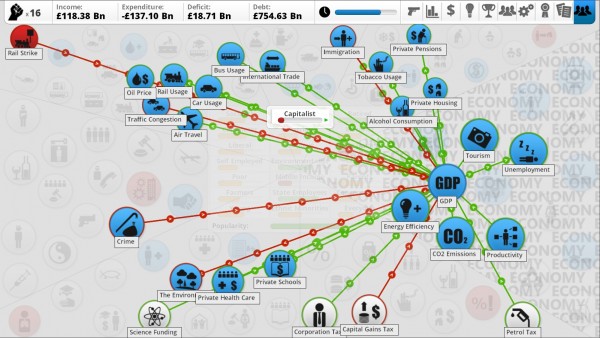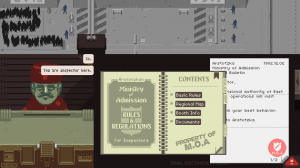
I was the President of the United States. I was working hard to end homelessness, stop vigilante mobs from taking the law into their own hands, and reduce our out-of-control deficit. And then a black power movement assassinated me. And that’s how my first game of Democracy 3 ended.
Democracy 3 is Positech Games’ extraordinarily deep political simulation. On the face of it, it’s exceedingly simple. You play the chief executive of a nation (America, Canada, the UK, France, Germany and possibly a sixth who I’ve forgotten). You expend political capital to address crises, appease voters, and pursue your own policy goals.
Of course, it’s far more complex than all that. Take the vigilante mobs, for instance. Of the two games I played, both America and Germany had vigilantes applying justice due to high crime rates. Crime in Democracy 3 is affected by a number of different variables just like in real life. The difference is that in real life, you don’t necessarily know what those variable are. But say you realize that poverty is one of biggest factors. Well, poverty is being effected by a number of other issues and policies; such as GDP and unemployment and well, there’s a global economic crisis happening. Often, in your quest to solve a single crisis, you end up working on a number of other issues in the hope that you can reduce that as well.
The solutions are varied. In my far more successful game as Germany, I managed to address the nationwide problem of alcohol abuse by both raising the drinking age to 21 and by legalizing cannabis. Those weren’t the only policy solutions, but they were the most direct (it also allowed me to tax cannabis to help me expand my budget surplus). That was after I’d subdued crime by pumping money into the police force and intelligence service and by creating a generous welfare state on top of that. I eventually ended poverty and crime altogether.
As far as interface goes, Democracy 3 is a charthound’s wet dream. There are more graphs and flowcharts here than you’d expect to find in an Excel spreadsheet, and virtually everything that’s clickable leads to another graph of some sort. However, that means you don’t get a map like in Rome III or Crusader Kings 2. Or even a character sprite. You, your opponents, the country and the voters exist in the abstract (although you can focus group voters and see how your political rivals are doing).
Everything is done with political capital, which you accumulate each turn based on the skills of your cabinet ministers. Ministers have their own desires for positions on your cabinet, vary in their loyalty to you, and also have different levels of effectiveness. Fail to keep your ministers happy and you could find yourself with a resignation on your hands, causing a massive decrease in your popularity. This will also be bad because it’s likely to have reduced the amount of political capital you have, making you less able to deal with a crisis.
I wouldn’t call Democracy 3 an “accurate” political simulator. But it is an enjoyable one. At the very least, it pushes the player to shunt aside their idealistic views to solve the problems of the here and now. Once those problems are solved, you can set about pursuing your own policy goals. Of course, a crisis can bubble up without you noticing (racial tensions exploded into race riots in my Germany because immigration had increased dramatically as the country’s economic situation improved). Then it becomes a question about whether you want to spend the money to fix it the way you believe in, or whether you’ll take the cheapest option out.
Who knows, maybe you’ll get re-elected with 90% of the vote.
Democracy 3 is available at 50% off for the next three days on Steam.
]]>
It was hard for me to work up the willingness to purchase Papers, Please, 3909 LLC’s game about a border checkpoint worker. $10 to check fictional paperwork? No thanks. But a string of good reviews kept my interest, so during the Labor Day weekend I coughed up the cash and set about learning how to stamp passports at the Grestin checkpoint between the fictional countries of Arstotska and Kolechia.
Papers, Please has appropriately been described as “bleak.” From the dull colors, to the pixelated artwork, to the plot and circumstances of the game (the war between Kolechia and your communist home country of Arstotska); Papers, Please is game that explores the darkness of the mundane. And yet, despite the interface which looks to repulse, it’s extraordinarily engrossing.
Dropped in without a tutorial or much instruction, it was up to me to figure out how to survive. The more people you process in the day, the greater your pay. But the faster you go, the more likely you are to make mistakes. And after a while, mistakes cost a lot. By about Day 3, I no longer had enough money to pay more than my rent; my poor performance at the checkpoint meant I had to forgo things like food and heat. Which meant my family fell sick. By the time I was able to earn enough money to pay for medication, my son had died from the combination of exposure, hunger, and illness. For the rest of the game, I was left with just my wife, mother-in-law, and uncle; until my sister died and I took in her niece.
Now, here’s what gets to me: for the rest of the game, I played as though my son’s death had had a serious impact on me, and changed the way I looked on my job; even though he was never more than a dot with the word “son” printed on it. I was more willing to bend rules. And I’d started to hit my stride as a passport inspector; able to adapt to the increasingly byzantine regulations my superiors were placing on immigration. I was also kind of a hard-ass, turning away journalists, detaining people (which thanks to a corrupt guard, earned me extra cash each time I did it, though I never detained anyone without a legitimate reason), refusing to let wives join their husbands due to expiration dates or printing errors.
The game ended for me when I assassinated a government agent sent to hunt down members of the resistance. This is one of 20 endings. At that point the government finally figured me out; though not before I’d assassinated another of their agents (with an incidental death of an innocent guard), and funneled multiple resistance agents into the country without proper documentation.
This is where it’s worth reflecting for me. Why did I, on my first play-through, make the choice to attempt to overthrow the government I was employed by? They once seized all my assets, true, but those were illegally gained by working for the resistance, and the government only got wise when I conspicuously spent them purchasing a new apartment (that money also allowed me to save my sick family). Perhaps it was the money the resistance compensated me with. Yet bribery never worked on me from anyone whose passport I checked. Or perhaps it was because Arstotska is presented as a totalitarian communist regime, and perhaps that’s why I wanted it overthrown, the natural default of Americans. Yet I never saw much of the oppression; I had almost zero information about what the regime was doing. Perhaps because I’m a romantic and a Rhode Islander, and rebels tend to have my sympathy. But the sad parade of people, who gave me more information about themselves than the resistance did, could hardly earn my hesitance before I stamped their passport.
Regardless of my reasoning, Papers, Please forced me to consider the following question in regard to bureaucrats: when do they get to decide to make the choice between what is legal and what is right? I did what I thought appropriate; help the resistance, but attempt to maintain a near-impeccable record elsewhere.
Small government advocates might think this game is a perfect way of demonstrating the overreach of government; but it’s not. It’s a great way of discussing bureaucracy; which isn’t intrinsic to government; but rather any large system. This game would work just as well were the setting a bank.
A moment that stands out to me was when a woman set a bomb on my desk and stood ready to die. It failed to go off, the guards detained her, and I eventually disarmed it, whereupon the corrupt guard sold it for scrap and gave a portion of the profit to me. I, personally, wasn’t the target. Arstotska was. But as a member of the bureaucracy, an employee of the government, I was a fine stand-in for Arstotska, even though I was sole breadwinner for four other people, and was just doing my job (to my estimation, none of the regulations ever seemed unreasonable, except for automatically strip-searching Kolechians, but that was stopped thanks to international pressure).
I was talking with a couple of former public employees recently, one of whom had recently left public service, and their outlook was that it was a relief to be out of government work. “It feels great to not be treated like I’m the scum on the bottom of someone’s boot,” said one, referring to the way we view our government workers in Rhode Island. It’s hard for us to separate the employee from the employer. Papers, Please forces us to consider that the bureaucrat in front of us is a human (in all its meanings), attempting to following complex rules, take care of their needs, and get through the day.
I’ve yet to play a game more relevant to our day-to-day lives.
]]> Everyone is certain to remember the controversy surrounding the 38 Studios $75 million loan guarantee deal. I, for one, was concerned about the tepid clawback provisions in the deal that would let 38 Studios off with a $400,000 fine if it didn’t create 400 jobs in the state. In any case, Kingdoms of Amalur was released this week, and it has been receiving stellar reviews from all over the country. Case in point is this glowing review from the New York Times.
Everyone is certain to remember the controversy surrounding the 38 Studios $75 million loan guarantee deal. I, for one, was concerned about the tepid clawback provisions in the deal that would let 38 Studios off with a $400,000 fine if it didn’t create 400 jobs in the state. In any case, Kingdoms of Amalur was released this week, and it has been receiving stellar reviews from all over the country. Case in point is this glowing review from the New York Times.
Kingdoms of Amalur: Reckoning isn’t just good. It sings with infectious, engaging excellence. This is a game that knows exactly what it wants to be, what it wants to provide and what its players will enjoy. Then it delivers with confidence, style and, not least, fun in abundance. Kingdoms of Amalur: Reckoning is one of the finest action role-playing games yet made.
I am very excited to play this game (although it’s something I’ll have to do after the semester ends). And my hope is that the placement of 38 Studios downtown, and the co-location of Hasbro’s children’s video games division right next to it, could result (with some significant collaboration and organizing at the state level) a new business cluster in Rhode Island.
One of the most important things the state needs to remember is that cluster development takes a long time to form and grow – there are no quick fixes to the state’s economy. But the state can help in broader economic development trends by making strong connections among related and supporting businesses. For instance, while the packaging was designed by 38 Studios, it needed to be created. The manufacturing sector is still the 4th largest industry in Rhode Island, and it’s likely that there are plenty of manufacturers that have the capacity to produce the packaging. Likewise, the actual disks needed to be pressed. Was there a local disk maker that could have been used? Then there is the shipping and logistics, warehousing, etc., all of which is possible in RI with connections to air and rail freight.
I’m sure that all of these additional support businesses can be found locally in the state, keeping more of the wealth created by 38 Studios in Rhode Island. We have amazing artists and designers coming out of RISD every year. And it wasn’t an accident that New England Tech created a Video Game Design program. It would be nice to leverage these incredible assets to promote further economic development in the state, rather than just complaining about taxes and unemployment. Of course the patience and deliberation required for long-term growth runs counter to our political system and national culture of immediacy. Thinking about this as a 20 year strategy doesn’t come easy, but wouldn’t it be awesome if, in 2032, we can celebrate Rhode Island as the video game capital of America?